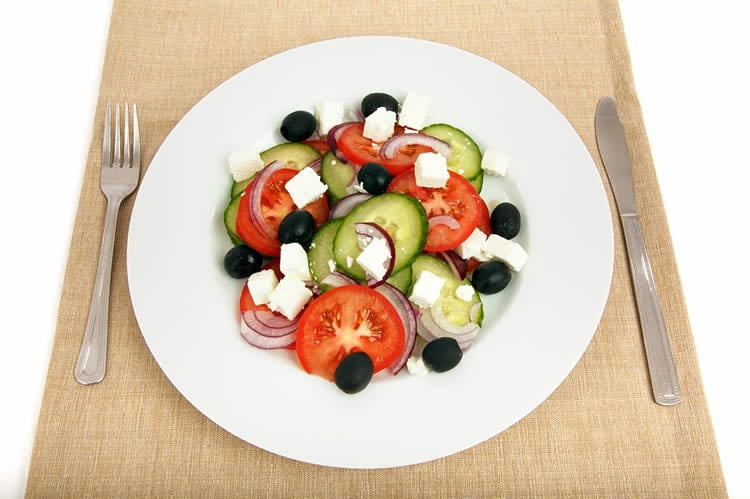Summary: A new study reports people who stick to a Mediterranean style diet have slower rates of cognitive decline, reduced conversion to Alzheimer’s and improved cognitive function.
Source: Frontiers.
Eating a Mediterranean diet can slow down cognitive decline.
The Mediterranean diet can improve your mind, as well your heart, shows a study published in the open-access journal Frontiers in Nutrition.
By sticking to the Mediterranean diet the study showed that people had slowed rates of cognitive decline, reduced conversion to Alzheimer’s, and improved cognitive function.
The main foods in the Mediterranean diet (MedDiet) include plant foods, such as leafy greens, fresh fruit and vegetables, cereals, beans, seeds, nuts, and legumes. The MedDiet is also low in dairy, has minimal red meat, and uses olive oil as its major source of fat.
Leading author Roy Hardman from the Centre for Human Psychopharmacology Swinburne University of Technology Melbourne Australia and his colleagues evaluated all the available papers between 2000-2015 that investigated if and how a MedDiet may impact cognitive processes over time. In total, 18 out of the 135 articles met their strict inclusion criteria.
“The most surprising result was that the positive effects were found in countries around the whole world. So regardless of being located outside of what is considered the Mediterranean region, the positive cognitive effects of a higher adherence to a MedDiet were similar in all evaluated papers;” he said.
Attention, memory, and language improved. Memory, in particular, was positively affected by the MedDiet including improvements in: delayed recognition, long-term, and working memory, executive function, and visual constructs.
“Why is a higher adherence to the MedDiet related to slowing down the rate of cognitive decline? The MedDiet offers the opportunity to change some of the modifiable risk factors,” he explained.
“These include reducing inflammatory responses, increasing micronutrients, improving vitamin and mineral imbalances, changing lipid profiles by using olive oils as the main source of dietary fats, maintaining weight and potentially reducing obesity, improving polyphenols in the blood, improving cellular energy metabolism and maybe changing the gut micro-biota, although this has not been examined to a larger extent yet.”

Moreover, the benefits to cognition afforded by the MedDiet were not exclusive to older individuals. Two of the included studies focused on younger adults and they both found improvements in cognition using computerized assessments.
The researchers stress that research in this area is important due to the expected extensive population aging over the next 20-30 years. They envision that the utilization of a dietary pattern, such as the MedDiet, will be an essential tool to maintain quality of life and reduce the potential social and economic burdens of manifested cognitive declines like dementia.
“I would therefore recommend people to try to adhere or switch to a MedDiet, even at an older age,” Hardman added.
Like many researchers, Hardman takes his research home: “I follow the diet patterns and do not eat any red meats, chicken or pork. I have fish two-three times per week and adhere to a Mediterranean style of eating.”
Source: Emily Barker – Frontiers
Image Source: This NeuroscienceNews.com image is in the public domain.
Original Research: Full open access research for “Adherence to a Mediterranean-Style Diet and Effects on Cognition in Adults: A Qualitative Evaluation and Systematic Review of Longitudinal and Prospective Trials” by Roy J. Hardman, Greg Kennedy, Helen Macpherson, Andrew B. Scholey and Andrew Pipingas in Frontiers in Nutrition. Published online July 22 2016 doi:10.3389/fnut.2016.00022
[cbtabs][cbtab title=”MLA”]Frontiers. “Could a Mediterranean Diet Help Reduce Alzheimer’s Risk and Improve Memory?.” NeuroscienceNews. NeuroscienceNews, 9 August 2016.
<https://neurosciencenews.com/memory-mediterranean-diet-4811/>.[/cbtab][cbtab title=”APA”]Frontiers. (2016, August 9). Could a Mediterranean Diet Help Reduce Alzheimer’s Risk and Improve Memory?. NeuroscienceNew. Retrieved August 9, 2016 from https://neurosciencenews.com/memory-mediterranean-diet-4811/[/cbtab][cbtab title=”Chicago”]Frontiers. “Could a Mediterranean Diet Help Reduce Alzheimer’s Risk and Improve Memory?.” https://neurosciencenews.com/memory-mediterranean-diet-4811/ (accessed August 9, 2016).[/cbtab][/cbtabs]
Abstract
Adherence to a Mediterranean-Style Diet and Effects on Cognition in Adults: A Qualitative Evaluation and Systematic Review of Longitudinal and Prospective Trials
The Mediterranean-style diet (MedDiet) involves substantial intake of fruits, vegetables, and fish, and a lower consumption of dairy, red meat, and sugars. Over the past 15 years, much empirical evidence supports the suggestion that a MedDiet may be beneficial with respect to reducing the incidence of cardiovascular disease, cancer, metabolic syndrome, and dementia. A number of cross-sectional studies that have examined the impact of MedDiet on cognition have yielded largely positive results. The objective of this review is to evaluate longitudinal and prospective trials to gain an understanding of how a MedDiet may impact cognitive processes over time. The included studies were aimed at improving cognition or minimizing of cognitive decline. Studies reviewed included assessments of dietary status using either a food frequency questionnaire or a food diary assessment. Eighteen articles meeting our inclusion criteria were subjected to systematic review. These revealed that higher adherence to a MedDiet is associated with slower rates of cognitive decline, reduced conversion to Alzheimer’s disease, and improvements in cognitive function. The specific cognitive domains that were found to benefit with improved Mediterranean Diet Score were memory (delayed recognition, long-term, and working memory), executive function, and visual constructs. The current review has also considered a number of methodological issues in making recommendations for future research. The utilization of a dietary pattern, such as the MedDiet, will be essential as part of the armamentarium to maintain quality of life and reduce the potential social and economic burden of dementia.
“Adherence to a Mediterranean-Style Diet and Effects on Cognition in Adults: A Qualitative Evaluation and Systematic Review of Longitudinal and Prospective Trials” by Roy J. Hardman, Greg Kennedy, Helen Macpherson, Andrew B. Scholey and Andrew Pipingas in Frontiers in Nutrition. Published online July 22 2016 doi:10.3389/fnut.2016.00022






